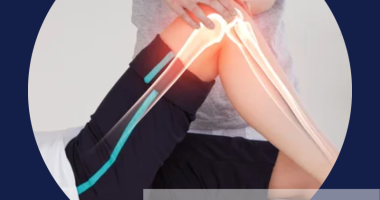Boron is a trace mineral found naturally in a variety of foods, including leafy green vegetables, fruits, nuts, and legumes. It plays a crucial role in brain function, and hormone regulation and maintaining strong bone health by supporting the metabolism of key vitamins and minerals like calcium, vitamin D, and estrogen, Integrative Medicine Clinician’s Journal, disclosed.
Both men and women require adequate boron intake for optimal bone health, but postmenopausal women may benefit the most from boron supplementation[1]. This is because boron helps to maintain strong, healthy bones by extending the half-life of key vitamins and hormones like vitamin D and estrogen. As women go through menopause, their estrogen levels decline significantly, leading to accelerated bone loss and an increased risk of osteoporosis[2]. So compared to younger women or men, postmenopausal women may benefit the most from boron supplementation due to their heightened risk of osteoporosis and the unique way boron interacts with their changing hormonal profile. Ensuring adequate boron intake through diet or supplements may help preserve bone density and reduce fracture risk in this population.
The Office of Dietary Supplements (ODS) of the National Institutes of Health (NIH) revealed that the symptoms of boron deficiency in humans are not fully known. However in the same report [3], animal study data suggest signs of boron deficiency may include abnormal limb development, delayed maturation of growth plates; and decreased bone strength, bone volume fraction, trabecular thickness, and impaired brain function. Boron deficiency is relatively uncommon but may be more prevalent in populations with limited access to boron-rich foods.
Most adults can meet their boron needs through a balanced diet rich in boron-containing foods, which provide between 1-3 mg of boron per day. Boron is not classified as an essential nutrient for humans because research has not yet identified a clear biological function for boron [3], so there is no recommended daily intake. However, the daily upper limit for boron from all sources (food, beverages, and supplements) is 20 mg for adults [4].
Boron supplements may be considered for adults who cannot meet their boron needs through diet alone, but this should be discussed with a healthcare provider. Boron supplements are available in various forms, such as boron aspartate, boron citrate, boron gluconate, and boron glycinate
Without sufficient boron, the body may struggle to properly utilize calcium, vitamin D, and other nutrients critical for bone growth and regeneration. Animal studies have shown that boron deficiency can lead to abnormal limb development, delayed bone maturation, and decreased bone strength.
To support strong, healthy bones, it is recommended that adults consume 3 mg of boron per day, either through dietary sources or supplements if needed. Talking to your doctor can help determine if boron supplementation is right for you, especially if you are at risk for osteoporosis or other bone health issues. Making boron-rich foods a regular part of your diet is an easy way to ensure your bones get the support they need. Continue reading to learn the benefits of boron on bone health and don’t miss 7 Habits That Strengthen Bones and Joints Naturally
Benefits of Boron for Bone Health
Boron Enhances Calcium Absorption and Utilization
One of boron’s primary benefits for bone health is its ability to improve calcium absorption and utilization in the body. Boron supplementation has been shown to reduce urinary excretion of calcium in postmenopausal women. This is because boron influences the production and activity of steroid hormones, which are involved in preventing calcium loss and bone demineralization[5].
Additionally, boron beneficially impacts vitamin D utilization. Supplementation with boron stimulates bone growth in vitamin D-deficient animals and alleviates dysfunctions in mineral metabolism characteristic of vitamin D deficiency.
Boron Stimulates Bone Growth and Regeneration
Boron plays a crucial role in osteogenesis, and its deficiency has been shown to adversely impact bone development and regeneration. Animal studies have found that boron deprivation exacerbates the distortion of marrow sprouts (the location of calcified scaffold erosion and new bone formation), increases the number of osteoclasts within the marrow sprouts, and delays the initiation of cartilage calcification[6].
Conversely, boron supplementation has been found to stimulate dental bone formation in rabbits and increase mineralized nodule formation by cultured osteoblasts (MC3t3-E1). Bioactive glasses modified to contain boron have also been shown to enhance bone formation, making them useful for bone tissue engineering and regeneration[7].
Boron Helps Maintain Bone Density and Prevent Osteoporosis
Boron supplementation has been found to increase mean trabecular density and thickness, trabecular bone volume, and cortical bone volume of femurs from rats with retinoic-induced osteoporosis. In a study of 100 patients with osteoporosis, calcium fructoborate incorporated into margarine improved bone density in 66 of the participants.
These findings suggest that boron supplementation can help maintain adequate bone mineral density, even at doses much lower than the upper level indicated by EFSA (10 mg/day)[8]. By controlling calcium, vitamin D, and sex steroid hormone metabolism, boron can effectively support bone health and prevent osteoporosis.
Improves Magnesium Absorption
Boron significantly improves the absorption of magnesium, which is essential for bone health. Magnesium acts as a cofactor for numerous enzymes that regulate calcium metabolism, and boron enhances its deposition in bones[9].
Helps with Vitamin D Absorption
Integrative Medicine: A Clinician’s Journal, revealed that boron also enhances the absorption of vitamin D, which is necessary for achieving healthy strong bones. Vitamin D deficiency can lead to conditions like rickets, which cause bone weakness and deformities. Boron supplementation has been shown to improve serum levels of vitamin D in vitamin D-deficient individuals.
Possible Side Effects of Boron
Like any nutrient, excessive intake of boron can lead to potential side effects, particularly when it comes to bone health. Here are the possible side effects of boron supplementation and how they can impact bone health according to The Office of Dietary Supplements, National Institutes of Health.
Fertility Issues
High doses of boron (over 20 mg per day) have been associated with male fertility problems . This is because boron can interfere with the production and function of testosterone, a key hormone for bone health and development. Reduced testosterone levels can lead to decreased bone mineral density and an increased risk of osteoporosis.
Mineral Imbalances
Excessive boron intake can disrupt the balance of other essential minerals like calcium, magnesium, and phosphorus, which are crucial for bone formation and strength . This mineral imbalance can lead to impaired bone remodeling, reduced bone density, and an increased risk of fractures.
Gastrointestinal Distress
Large doses of boron supplementation (above the recommended upper limit of 20 mg per day) can cause gastrointestinal side effects such as diarrhea, vomiting, and abdominal pain . These digestive issues can interfere with the absorption of nutrients necessary for bone health, potentially leading to deficiencies and weakened bones.
Neurological Symptoms
Excessive boron intake has been linked to neurological symptoms like irritability, tremors, and weakness . These neurological effects can indirectly impact bone health by affecting overall physical function and mobility, which are essential for maintaining strong, healthy bones.
Toxicity and Poisoning
In rare cases, extremely high doses of boron (well above the recommended upper limit) can lead to boron toxicity and poisoning, which can cause severe symptoms like seizures, coma, and even death . Boron toxicity can have devastating effects on bone health, leading to rapid bone loss, fractures, and other skeletal complications.
It’s important to note that the potential side effects of boron supplementation are typically only observed with excessive, long-term intake, well above the recommended daily intake. When taken within the recommended guidelines (typically 3 mg per day), boron has been shown to have beneficial effects on bone health, including improved bone mineral density and reduced risk of osteoporosis.
What’s the Best Time to Take Boron Supplement?
The best time to take a boron supplement is a few hours before bed, as this allows the supplement to be fully activated and effective throughout the night. Boron works on the principle of “less is more,” meaning that the body can adjust to the supplement over time, and the dosage can be reduced as needed. This timing allows the supplement to have the greatest impact on bone health and other bodily functions.
Top Foods Rich in Boron
- Prune juice (1.43 mg per cup)
- Avocado (1.07 mg per 1/2 cup)
- Raisins (0.95 mg per 1.5 oz)
- Peaches (0.80 mg per medium peach)
- Grape juice (0.76 mg per cup)
- Apples (0.66 mg per medium apple)
- Peanuts (0.48 mg per 1 oz)
- Broccoli (0.40 mg per 1 cup boiled)
- Oranges (0.37 mg per medium orange)
- Bananas (0.16 mg per medium banana)
- Coffee (0.07 mg per cup)
- Milk (0.04 mg per cup)
- Soybeans (1 cup, 0.98 mg)
- Lentils (1 cup, 0.50 mg )
- Chickpeas (1 cup, 0.45 mg )
- Black beans (1 cup, 0.42 mg )
- Almonds (1 ounce, 0.35 mg )
- Cashews ( 1 ounce, 0.15 mg )
- Pecans (1 ounce, 0.14 mg )
Extra References
- WebMD. (n.d.). BORON – Uses, Side Effects, and More. Retrieved from https://www.webmd.com/vitamins/ai/ingredientmono-894/boron
- Rondanelli, M., Faliva, M. A., Peroni, G., Infantino, V., Gasparri, C., Iannello, G., … & Tartara, A. (2020). Pivotal role of boron supplementation on bone health: A narrative review. Journal of Trace Elements in Medicine and Biology, 62, 126575.
- Hakki, S. S., Bozkurt, B. S., & Hakki, E. E. (2010). Boron enhances cementoblast differentiation and mineralization in vitro: a morphological and biochemical study. Connective tissue research, 51(2), 116-126.
- Pizzorno, L. (2015). Nothing boring about boron. Integrative medicine (Encinitas, Calif.), 14(4), 35.










